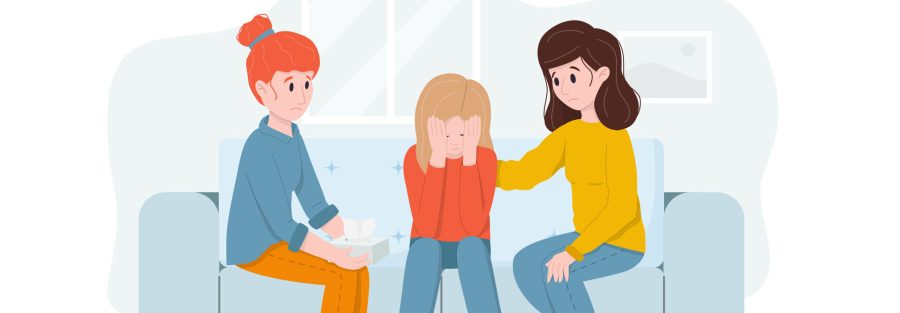‘Forgotten’ and unsupported: the experiences of informal carers in Northern Ireland during COVID-19

How have unpaid family carers been affected during the pandemic – in terms of their finances, work prospects and mental wellbeing? Here we present extracts from a series of interviews conducted across Northern Ireland during the COVID-19 lockdown periods
Lisa Smyth
The Caring Through Vulnerability project has investigated the links between vulnerability and care during the pandemic in Northern Ireland, as part of Queen’s University Belfast Social Sciences’ rapid response to COVID-19. Exploratory interviews were carried out with 25 informal family carers aged from their late-30s to their 70s during summer 2020 and spring/summer 2021. In all, 21 women and four men were interviewed; each was providing care for disabled or ill children, spouses or parents with clinical vulnerability to COVID-19. Here is a brief edited selection of their responses.
‘Six weeks before we could get food’
Most of the informal carers interviewed for this project indicated they felt ‘forgotten’ and unsupported during the pandemic response. Carers described the struggles they faced over accessing food, medicine, personal protective equipment (PPE), nursing and practical help. Janet*, who cares for her eight-year-old disabled daughter, explained her circumstances:
‘It took us six weeks before we could get food, that was a really tough time. We couldn’t get supermarket slots; I ended up writing to every MP I could think of because we just could not get food … We were relying on everyone: friends, neighbours, even school friends from 20 years ago … It was absolutely horrendous, especially because of my daughter’s medical needs. She is on a very high-fat, high-protein diet. In those early days, my husband did break shielding to get food. It was frightening … I had stockpiled considerably, but it was those fresh items you can’t freeze or stockpile that she [daughter] would be relying on.’
‘I made loads of mistakes at work’
From a work perspective, the impact of long-term stress on carers’ abilities to earn a living is significant, and was heightened during the pandemic. Caregiving became very difficult to juggle with full-time employment. Paula was working from home and caring for her severely disabled parents, with the full support of her manager. While work was a lifeline, it was very stressful juggling with care:
‘Work is my respite. I love work but it is really tough juggling both – it’s just rushing from my desk to my parents. I thought: “What am I doing? Nobody on this planet should be expected to care 24/7 for somebody while also having a full-time job.” Turns out I made loads of mistakes at work. The stress and distress were so overwhelming, it impacted my memory. I couldn’t remember so many things from day to day and minute to minute, hence mistakes – and hair loss … I was upset at having to nurse them to death. Things quickly escalate with so much to deal with.’
‘I was going to have a heart attack’
Nuala was similarly committed to her career, but resigned from her job as a senior health professional during the pandemic. Although the helpline that she managed was moved online, she received no support from her manager for working from home, which was essential to enable her to care for her severely disabled parents:
‘The very first day I worked from home, [my manager] said: “If you are telling me you have so little work that you can work from home then I will redeploy you to ICU.”’
Experiencing severe stress and coming close to retirement, Nuala resigned from her job when her manager then threatened to move her to a COVID testing centre:
‘I was going to have a heart attack, to be quite honest … I had to hand my notice in at work because I thought I was going out of my mind with stress. It was just awful. I can’t even really talk about it, and I don’t really want to. It was absolutely overwhelming …’
‘How am I going to keep doing this?’
Many family carers were exhausted by the increased burden of care, and Annie’s comment that ‘I just feel on edge all the time’ was common. This could be accompanied by a risk of injury. Susan had to lift and manoeuvre her severely disabled adult daughter unaided:
‘My daughter is assessed as needing three people to move and handle her, and I am doing it by myself during the day. She is a really poor sleeper, so you never get a decent night’s sleep. There have been days where you think: “Oh my god, how am I going to keep doing this?” It is very difficult because my daughter is effectively an eight-month-old baby in an adult body. She needs to be changed four-to-five times a day; all of that is hoisting and moving her. It is hard. I am only 5ft 2 – she is 11 stone and a dead weight, she can’t help you.’
‘I am stretched to the limit’
The onset of the pandemic left some already exhausted carers, including Alice, feeling close to despair:
‘I’m coping but I am stretched to the limit – I’m just thinking: “Could this get any worse?” … I was practically at breaking point [after her husband was admitted to hospital]. I drove home, got into bed, and just lay there in shock. I just kept thinking: “I don’t want to live” – and then I was physically ill. I really don’t know how I existed until the next day.’
Rachel, who works part-time and cares for her mother, insisted that ‘carers aren’t looking for pity – they are looking for help’.
*All names and other identifying details in this article have been changed.
- Dr Lisa Smyth is Senior Lecturer in the School of Social Sciences, Education and Social Work at Queen’s University, Belfast.
